Employee Retention: Analyzing the Effects of Monetary Rewards
VerifiedAdded on 2020/10/22
|8
|1962
|224
Report
AI Summary
This report explores the impact of monetary rewards on employee retention. It begins by defining employee retention and its importance to a company's success, highlighting how high turnover can negatively affect a company. The report then delves into the effectiveness of monetary rewards, such as bonuses, salary raises, and gifts (extrinsic rewards), and intrinsic rewards, like feedback, recognition, and empowerment. It discusses how these rewards attract employees, motivate performance, and contribute to skill development and a positive work culture, ultimately minimizing turnover. The report concludes that rewards play a vital role in retaining quality employees and provides various advantages in attracting, motivating, and developing employees. Finally, the report includes an extensive list of references from various books, journals, and online sources.
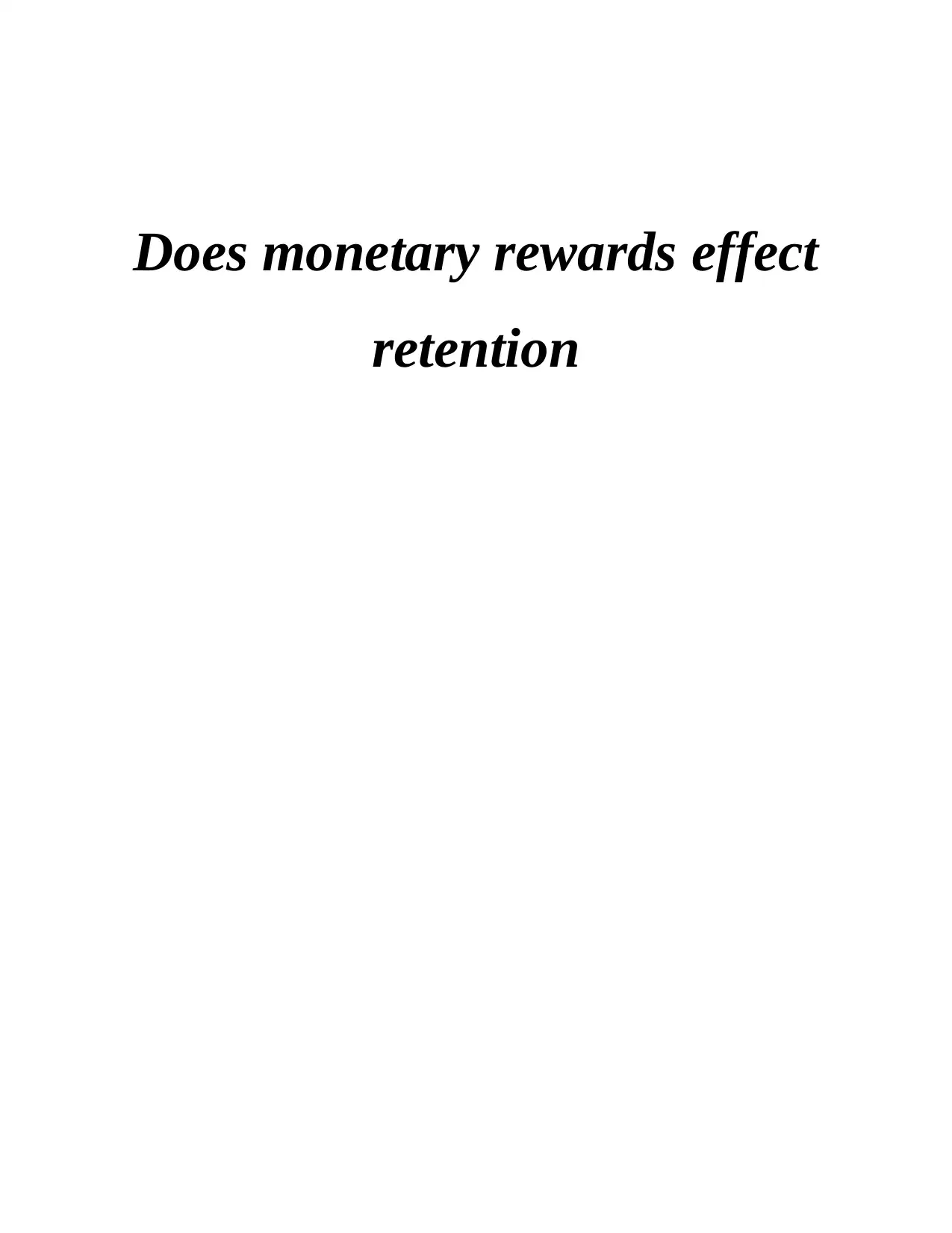
Does monetary rewards effect
retention
retention
Paraphrase This Document
Need a fresh take? Get an instant paraphrase of this document with our AI Paraphraser
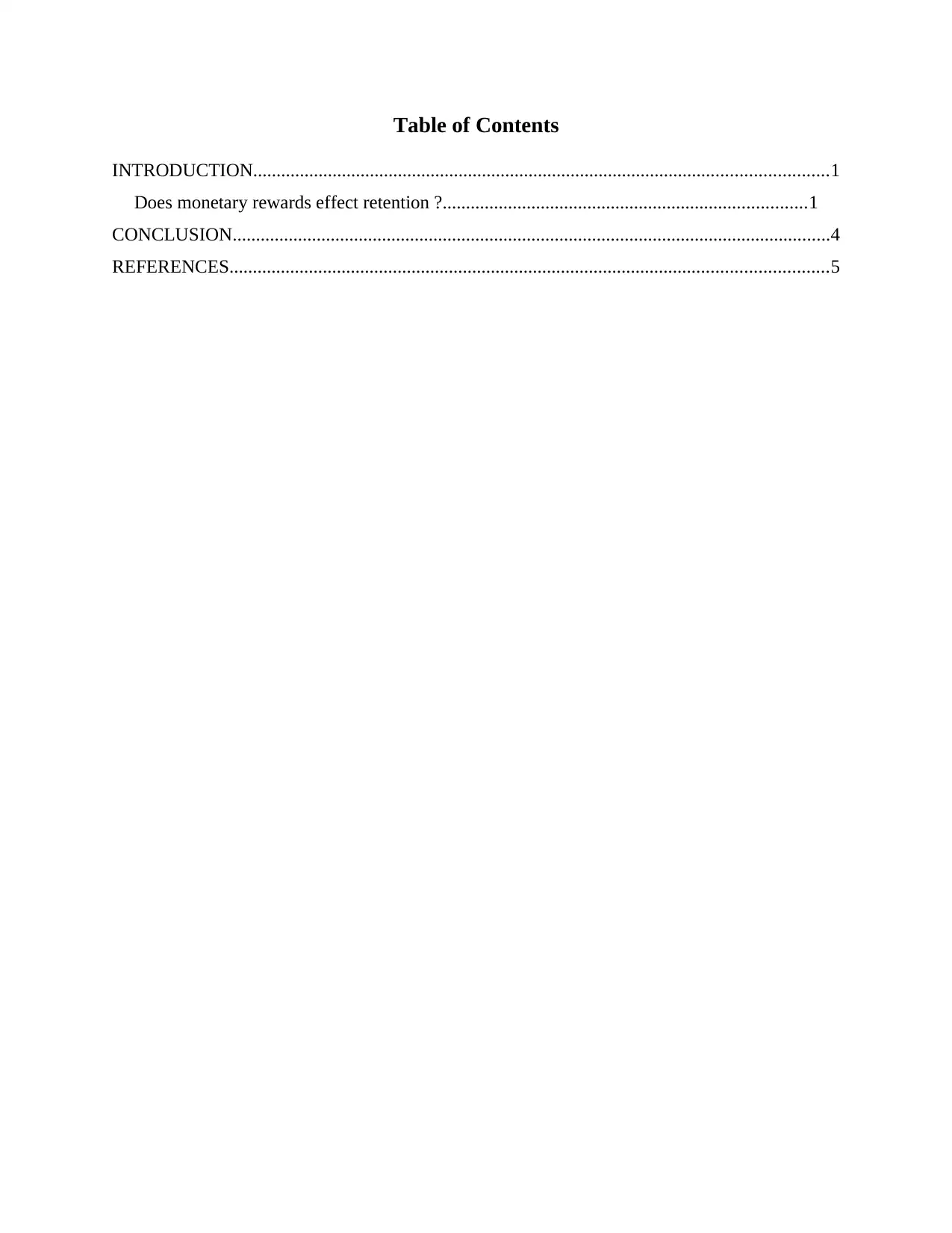
Table of Contents
INTRODUCTION...........................................................................................................................1
Does monetary rewards effect retention ?..............................................................................1
CONCLUSION................................................................................................................................4
REFERENCES................................................................................................................................5
INTRODUCTION...........................................................................................................................1
Does monetary rewards effect retention ?..............................................................................1
CONCLUSION................................................................................................................................4
REFERENCES................................................................................................................................5
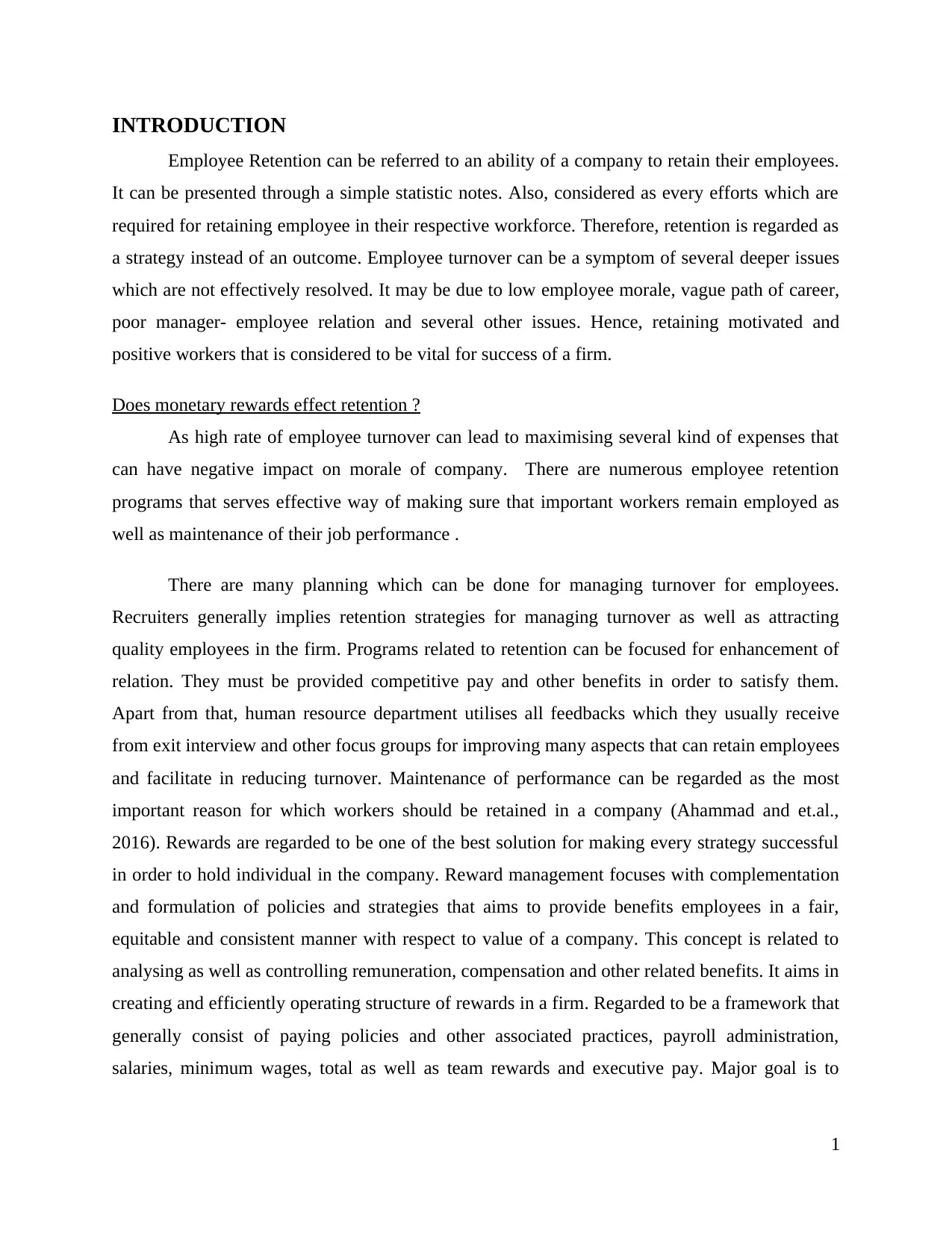
INTRODUCTION
Employee Retention can be referred to an ability of a company to retain their employees.
It can be presented through a simple statistic notes. Also, considered as every efforts which are
required for retaining employee in their respective workforce. Therefore, retention is regarded as
a strategy instead of an outcome. Employee turnover can be a symptom of several deeper issues
which are not effectively resolved. It may be due to low employee morale, vague path of career,
poor manager- employee relation and several other issues. Hence, retaining motivated and
positive workers that is considered to be vital for success of a firm.
Does monetary rewards effect retention ?
As high rate of employee turnover can lead to maximising several kind of expenses that
can have negative impact on morale of company. There are numerous employee retention
programs that serves effective way of making sure that important workers remain employed as
well as maintenance of their job performance .
There are many planning which can be done for managing turnover for employees.
Recruiters generally implies retention strategies for managing turnover as well as attracting
quality employees in the firm. Programs related to retention can be focused for enhancement of
relation. They must be provided competitive pay and other benefits in order to satisfy them.
Apart from that, human resource department utilises all feedbacks which they usually receive
from exit interview and other focus groups for improving many aspects that can retain employees
and facilitate in reducing turnover. Maintenance of performance can be regarded as the most
important reason for which workers should be retained in a company (Ahammad and et.al.,
2016). Rewards are regarded to be one of the best solution for making every strategy successful
in order to hold individual in the company. Reward management focuses with complementation
and formulation of policies and strategies that aims to provide benefits employees in a fair,
equitable and consistent manner with respect to value of a company. This concept is related to
analysing as well as controlling remuneration, compensation and other related benefits. It aims in
creating and efficiently operating structure of rewards in a firm. Regarded to be a framework that
generally consist of paying policies and other associated practices, payroll administration,
salaries, minimum wages, total as well as team rewards and executive pay. Major goal is to
1
Employee Retention can be referred to an ability of a company to retain their employees.
It can be presented through a simple statistic notes. Also, considered as every efforts which are
required for retaining employee in their respective workforce. Therefore, retention is regarded as
a strategy instead of an outcome. Employee turnover can be a symptom of several deeper issues
which are not effectively resolved. It may be due to low employee morale, vague path of career,
poor manager- employee relation and several other issues. Hence, retaining motivated and
positive workers that is considered to be vital for success of a firm.
Does monetary rewards effect retention ?
As high rate of employee turnover can lead to maximising several kind of expenses that
can have negative impact on morale of company. There are numerous employee retention
programs that serves effective way of making sure that important workers remain employed as
well as maintenance of their job performance .
There are many planning which can be done for managing turnover for employees.
Recruiters generally implies retention strategies for managing turnover as well as attracting
quality employees in the firm. Programs related to retention can be focused for enhancement of
relation. They must be provided competitive pay and other benefits in order to satisfy them.
Apart from that, human resource department utilises all feedbacks which they usually receive
from exit interview and other focus groups for improving many aspects that can retain employees
and facilitate in reducing turnover. Maintenance of performance can be regarded as the most
important reason for which workers should be retained in a company (Ahammad and et.al.,
2016). Rewards are regarded to be one of the best solution for making every strategy successful
in order to hold individual in the company. Reward management focuses with complementation
and formulation of policies and strategies that aims to provide benefits employees in a fair,
equitable and consistent manner with respect to value of a company. This concept is related to
analysing as well as controlling remuneration, compensation and other related benefits. It aims in
creating and efficiently operating structure of rewards in a firm. Regarded to be a framework that
generally consist of paying policies and other associated practices, payroll administration,
salaries, minimum wages, total as well as team rewards and executive pay. Major goal is to
1
⊘ This is a preview!⊘
Do you want full access?
Subscribe today to unlock all pages.

Trusted by 1+ million students worldwide
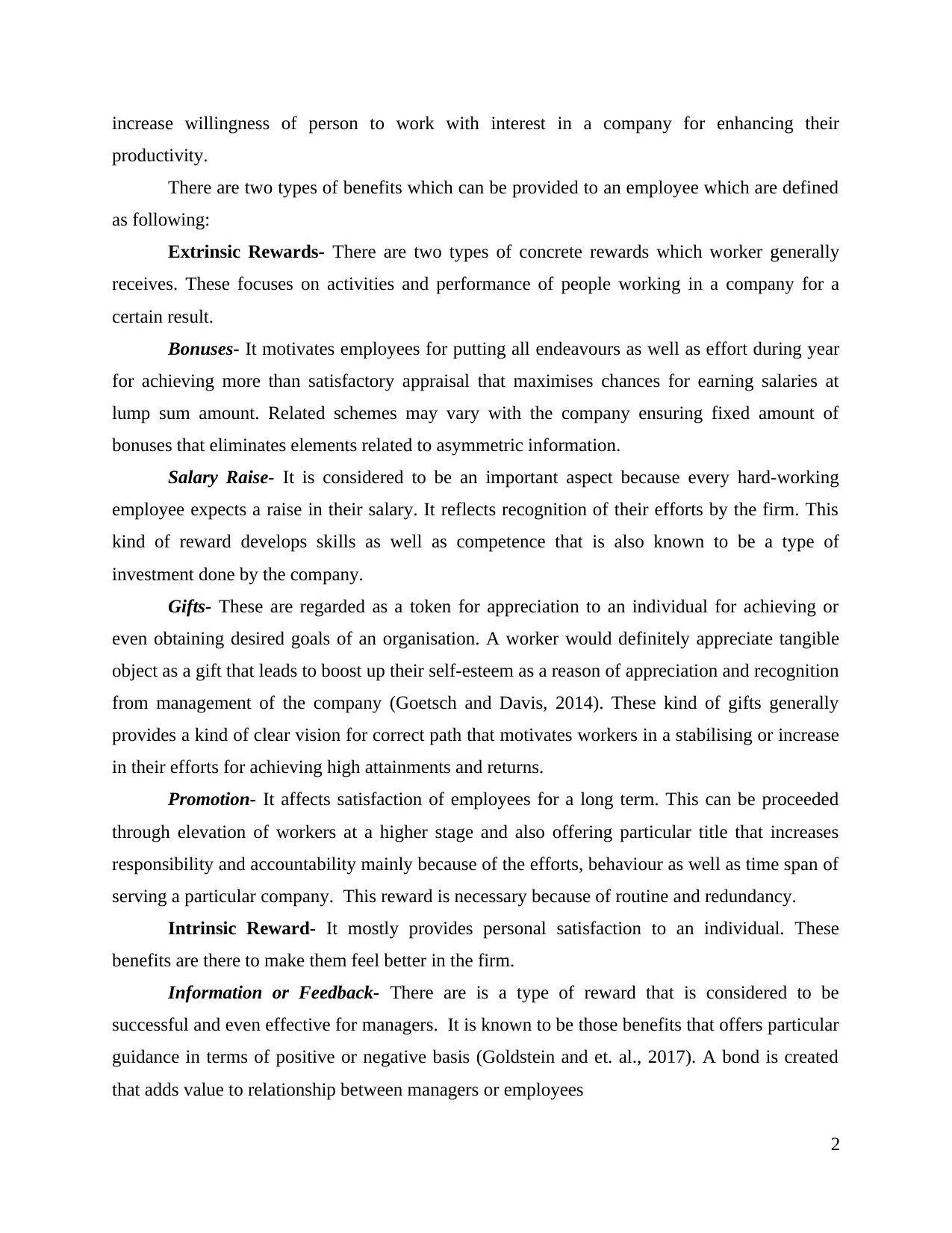
increase willingness of person to work with interest in a company for enhancing their
productivity.
There are two types of benefits which can be provided to an employee which are defined
as following:
Extrinsic Rewards- There are two types of concrete rewards which worker generally
receives. These focuses on activities and performance of people working in a company for a
certain result.
Bonuses- It motivates employees for putting all endeavours as well as effort during year
for achieving more than satisfactory appraisal that maximises chances for earning salaries at
lump sum amount. Related schemes may vary with the company ensuring fixed amount of
bonuses that eliminates elements related to asymmetric information.
Salary Raise- It is considered to be an important aspect because every hard-working
employee expects a raise in their salary. It reflects recognition of their efforts by the firm. This
kind of reward develops skills as well as competence that is also known to be a type of
investment done by the company.
Gifts- These are regarded as a token for appreciation to an individual for achieving or
even obtaining desired goals of an organisation. A worker would definitely appreciate tangible
object as a gift that leads to boost up their self-esteem as a reason of appreciation and recognition
from management of the company (Goetsch and Davis, 2014). These kind of gifts generally
provides a kind of clear vision for correct path that motivates workers in a stabilising or increase
in their efforts for achieving high attainments and returns.
Promotion- It affects satisfaction of employees for a long term. This can be proceeded
through elevation of workers at a higher stage and also offering particular title that increases
responsibility and accountability mainly because of the efforts, behaviour as well as time span of
serving a particular company. This reward is necessary because of routine and redundancy.
Intrinsic Reward- It mostly provides personal satisfaction to an individual. These
benefits are there to make them feel better in the firm.
Information or Feedback- There are is a type of reward that is considered to be
successful and even effective for managers. It is known to be those benefits that offers particular
guidance in terms of positive or negative basis (Goldstein and et. al., 2017). A bond is created
that adds value to relationship between managers or employees
2
productivity.
There are two types of benefits which can be provided to an employee which are defined
as following:
Extrinsic Rewards- There are two types of concrete rewards which worker generally
receives. These focuses on activities and performance of people working in a company for a
certain result.
Bonuses- It motivates employees for putting all endeavours as well as effort during year
for achieving more than satisfactory appraisal that maximises chances for earning salaries at
lump sum amount. Related schemes may vary with the company ensuring fixed amount of
bonuses that eliminates elements related to asymmetric information.
Salary Raise- It is considered to be an important aspect because every hard-working
employee expects a raise in their salary. It reflects recognition of their efforts by the firm. This
kind of reward develops skills as well as competence that is also known to be a type of
investment done by the company.
Gifts- These are regarded as a token for appreciation to an individual for achieving or
even obtaining desired goals of an organisation. A worker would definitely appreciate tangible
object as a gift that leads to boost up their self-esteem as a reason of appreciation and recognition
from management of the company (Goetsch and Davis, 2014). These kind of gifts generally
provides a kind of clear vision for correct path that motivates workers in a stabilising or increase
in their efforts for achieving high attainments and returns.
Promotion- It affects satisfaction of employees for a long term. This can be proceeded
through elevation of workers at a higher stage and also offering particular title that increases
responsibility and accountability mainly because of the efforts, behaviour as well as time span of
serving a particular company. This reward is necessary because of routine and redundancy.
Intrinsic Reward- It mostly provides personal satisfaction to an individual. These
benefits are there to make them feel better in the firm.
Information or Feedback- There are is a type of reward that is considered to be
successful and even effective for managers. It is known to be those benefits that offers particular
guidance in terms of positive or negative basis (Goldstein and et. al., 2017). A bond is created
that adds value to relationship between managers or employees
2
Paraphrase This Document
Need a fresh take? Get an instant paraphrase of this document with our AI Paraphraser
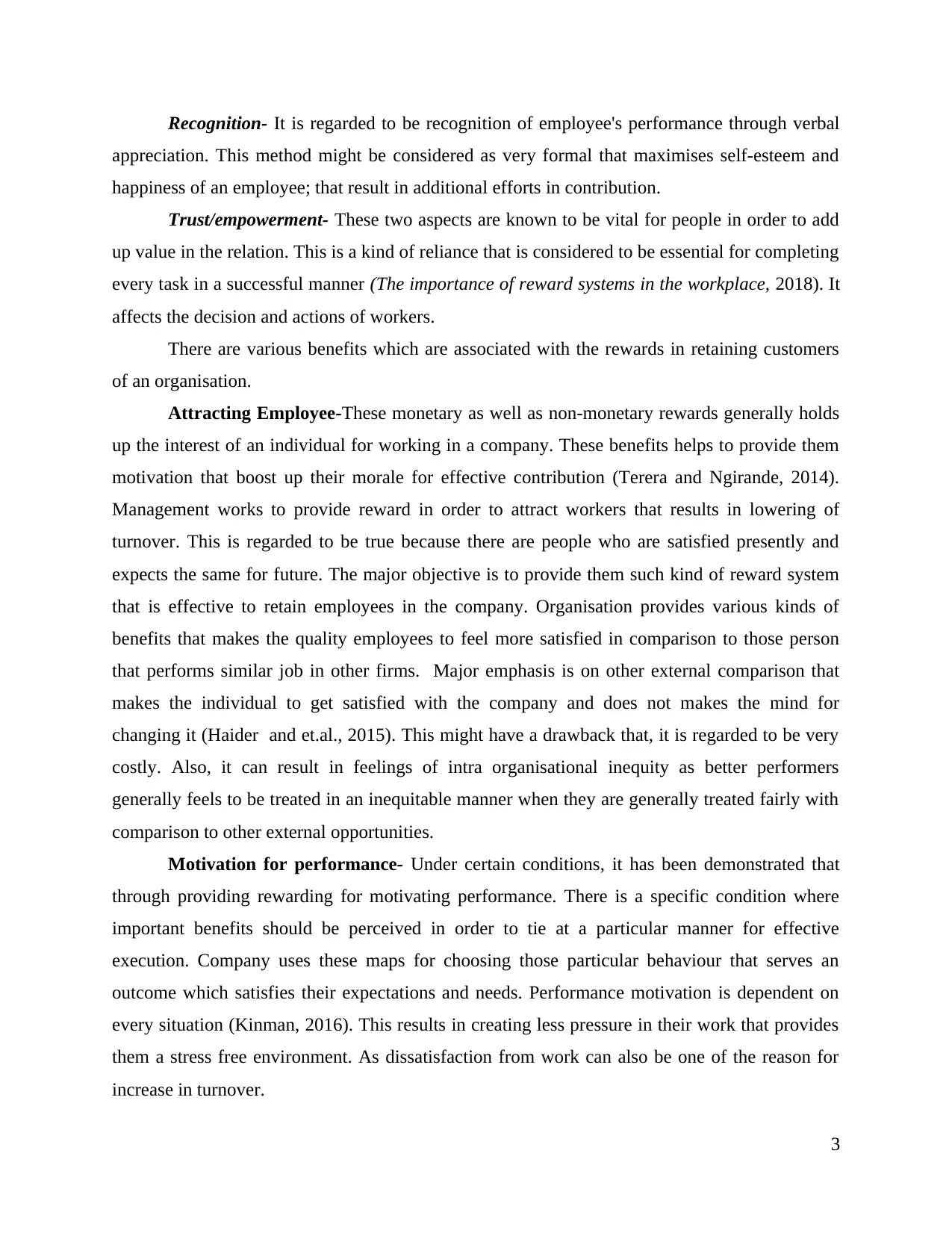
Recognition- It is regarded to be recognition of employee's performance through verbal
appreciation. This method might be considered as very formal that maximises self-esteem and
happiness of an employee; that result in additional efforts in contribution.
Trust/empowerment- These two aspects are known to be vital for people in order to add
up value in the relation. This is a kind of reliance that is considered to be essential for completing
every task in a successful manner (The importance of reward systems in the workplace, 2018). It
affects the decision and actions of workers.
There are various benefits which are associated with the rewards in retaining customers
of an organisation.
Attracting Employee-These monetary as well as non-monetary rewards generally holds
up the interest of an individual for working in a company. These benefits helps to provide them
motivation that boost up their morale for effective contribution (Terera and Ngirande, 2014).
Management works to provide reward in order to attract workers that results in lowering of
turnover. This is regarded to be true because there are people who are satisfied presently and
expects the same for future. The major objective is to provide them such kind of reward system
that is effective to retain employees in the company. Organisation provides various kinds of
benefits that makes the quality employees to feel more satisfied in comparison to those person
that performs similar job in other firms. Major emphasis is on other external comparison that
makes the individual to get satisfied with the company and does not makes the mind for
changing it (Haider and et.al., 2015). This might have a drawback that, it is regarded to be very
costly. Also, it can result in feelings of intra organisational inequity as better performers
generally feels to be treated in an inequitable manner when they are generally treated fairly with
comparison to other external opportunities.
Motivation for performance- Under certain conditions, it has been demonstrated that
through providing rewarding for motivating performance. There is a specific condition where
important benefits should be perceived in order to tie at a particular manner for effective
execution. Company uses these maps for choosing those particular behaviour that serves an
outcome which satisfies their expectations and needs. Performance motivation is dependent on
every situation (Kinman, 2016). This results in creating less pressure in their work that provides
them a stress free environment. As dissatisfaction from work can also be one of the reason for
increase in turnover.
3
appreciation. This method might be considered as very formal that maximises self-esteem and
happiness of an employee; that result in additional efforts in contribution.
Trust/empowerment- These two aspects are known to be vital for people in order to add
up value in the relation. This is a kind of reliance that is considered to be essential for completing
every task in a successful manner (The importance of reward systems in the workplace, 2018). It
affects the decision and actions of workers.
There are various benefits which are associated with the rewards in retaining customers
of an organisation.
Attracting Employee-These monetary as well as non-monetary rewards generally holds
up the interest of an individual for working in a company. These benefits helps to provide them
motivation that boost up their morale for effective contribution (Terera and Ngirande, 2014).
Management works to provide reward in order to attract workers that results in lowering of
turnover. This is regarded to be true because there are people who are satisfied presently and
expects the same for future. The major objective is to provide them such kind of reward system
that is effective to retain employees in the company. Organisation provides various kinds of
benefits that makes the quality employees to feel more satisfied in comparison to those person
that performs similar job in other firms. Major emphasis is on other external comparison that
makes the individual to get satisfied with the company and does not makes the mind for
changing it (Haider and et.al., 2015). This might have a drawback that, it is regarded to be very
costly. Also, it can result in feelings of intra organisational inequity as better performers
generally feels to be treated in an inequitable manner when they are generally treated fairly with
comparison to other external opportunities.
Motivation for performance- Under certain conditions, it has been demonstrated that
through providing rewarding for motivating performance. There is a specific condition where
important benefits should be perceived in order to tie at a particular manner for effective
execution. Company uses these maps for choosing those particular behaviour that serves an
outcome which satisfies their expectations and needs. Performance motivation is dependent on
every situation (Kinman, 2016). This results in creating less pressure in their work that provides
them a stress free environment. As dissatisfaction from work can also be one of the reason for
increase in turnover.
3
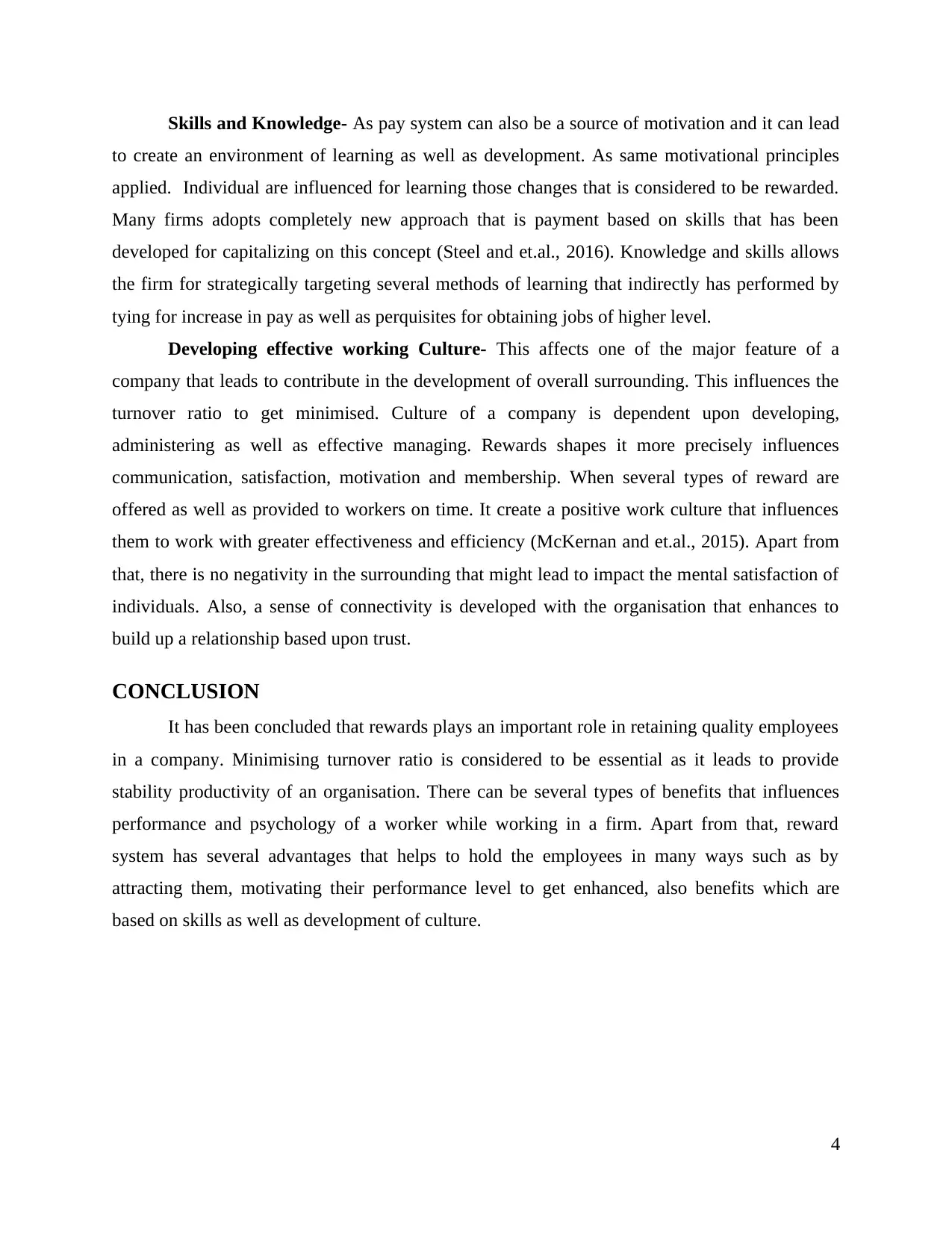
Skills and Knowledge- As pay system can also be a source of motivation and it can lead
to create an environment of learning as well as development. As same motivational principles
applied. Individual are influenced for learning those changes that is considered to be rewarded.
Many firms adopts completely new approach that is payment based on skills that has been
developed for capitalizing on this concept (Steel and et.al., 2016). Knowledge and skills allows
the firm for strategically targeting several methods of learning that indirectly has performed by
tying for increase in pay as well as perquisites for obtaining jobs of higher level.
Developing effective working Culture- This affects one of the major feature of a
company that leads to contribute in the development of overall surrounding. This influences the
turnover ratio to get minimised. Culture of a company is dependent upon developing,
administering as well as effective managing. Rewards shapes it more precisely influences
communication, satisfaction, motivation and membership. When several types of reward are
offered as well as provided to workers on time. It create a positive work culture that influences
them to work with greater effectiveness and efficiency (McKernan and et.al., 2015). Apart from
that, there is no negativity in the surrounding that might lead to impact the mental satisfaction of
individuals. Also, a sense of connectivity is developed with the organisation that enhances to
build up a relationship based upon trust.
CONCLUSION
It has been concluded that rewards plays an important role in retaining quality employees
in a company. Minimising turnover ratio is considered to be essential as it leads to provide
stability productivity of an organisation. There can be several types of benefits that influences
performance and psychology of a worker while working in a firm. Apart from that, reward
system has several advantages that helps to hold the employees in many ways such as by
attracting them, motivating their performance level to get enhanced, also benefits which are
based on skills as well as development of culture.
4
to create an environment of learning as well as development. As same motivational principles
applied. Individual are influenced for learning those changes that is considered to be rewarded.
Many firms adopts completely new approach that is payment based on skills that has been
developed for capitalizing on this concept (Steel and et.al., 2016). Knowledge and skills allows
the firm for strategically targeting several methods of learning that indirectly has performed by
tying for increase in pay as well as perquisites for obtaining jobs of higher level.
Developing effective working Culture- This affects one of the major feature of a
company that leads to contribute in the development of overall surrounding. This influences the
turnover ratio to get minimised. Culture of a company is dependent upon developing,
administering as well as effective managing. Rewards shapes it more precisely influences
communication, satisfaction, motivation and membership. When several types of reward are
offered as well as provided to workers on time. It create a positive work culture that influences
them to work with greater effectiveness and efficiency (McKernan and et.al., 2015). Apart from
that, there is no negativity in the surrounding that might lead to impact the mental satisfaction of
individuals. Also, a sense of connectivity is developed with the organisation that enhances to
build up a relationship based upon trust.
CONCLUSION
It has been concluded that rewards plays an important role in retaining quality employees
in a company. Minimising turnover ratio is considered to be essential as it leads to provide
stability productivity of an organisation. There can be several types of benefits that influences
performance and psychology of a worker while working in a firm. Apart from that, reward
system has several advantages that helps to hold the employees in many ways such as by
attracting them, motivating their performance level to get enhanced, also benefits which are
based on skills as well as development of culture.
4
⊘ This is a preview!⊘
Do you want full access?
Subscribe today to unlock all pages.

Trusted by 1+ million students worldwide
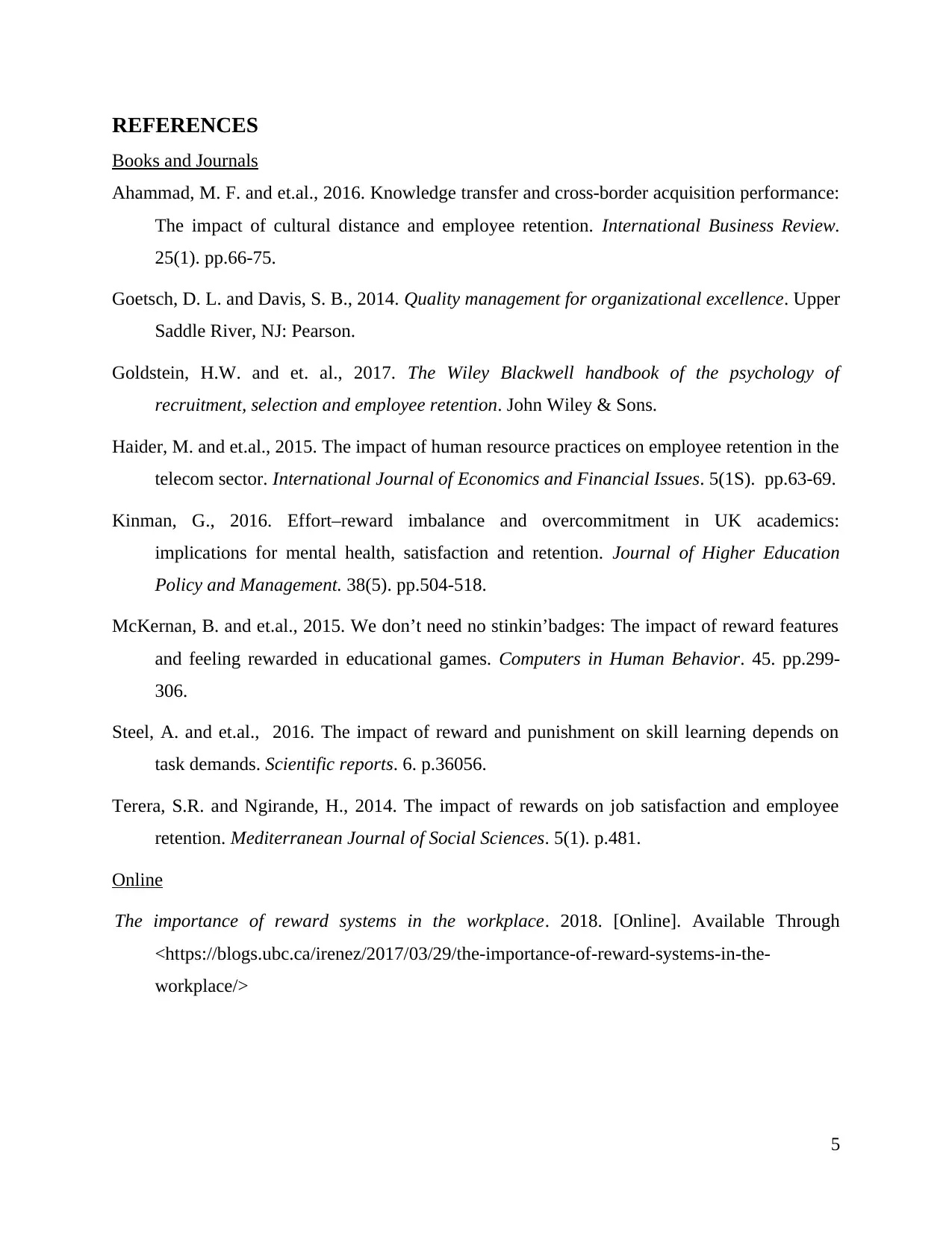
REFERENCES
Books and Journals
Ahammad, M. F. and et.al., 2016. Knowledge transfer and cross-border acquisition performance:
The impact of cultural distance and employee retention. International Business Review.
25(1). pp.66-75.
Goetsch, D. L. and Davis, S. B., 2014. Quality management for organizational excellence. Upper
Saddle River, NJ: Pearson.
Goldstein, H.W. and et. al., 2017. The Wiley Blackwell handbook of the psychology of
recruitment, selection and employee retention. John Wiley & Sons.
Haider, M. and et.al., 2015. The impact of human resource practices on employee retention in the
telecom sector. International Journal of Economics and Financial Issues. 5(1S). pp.63-69.
Kinman, G., 2016. Effort–reward imbalance and overcommitment in UK academics:
implications for mental health, satisfaction and retention. Journal of Higher Education
Policy and Management. 38(5). pp.504-518.
McKernan, B. and et.al., 2015. We don’t need no stinkin’badges: The impact of reward features
and feeling rewarded in educational games. Computers in Human Behavior. 45. pp.299-
306.
Steel, A. and et.al., 2016. The impact of reward and punishment on skill learning depends on
task demands. Scientific reports. 6. p.36056.
Terera, S.R. and Ngirande, H., 2014. The impact of rewards on job satisfaction and employee
retention. Mediterranean Journal of Social Sciences. 5(1). p.481.
Online
The importance of reward systems in the workplace. 2018. [Online]. Available Through
<https://blogs.ubc.ca/irenez/2017/03/29/the-importance-of-reward-systems-in-the-
workplace/>
5
Books and Journals
Ahammad, M. F. and et.al., 2016. Knowledge transfer and cross-border acquisition performance:
The impact of cultural distance and employee retention. International Business Review.
25(1). pp.66-75.
Goetsch, D. L. and Davis, S. B., 2014. Quality management for organizational excellence. Upper
Saddle River, NJ: Pearson.
Goldstein, H.W. and et. al., 2017. The Wiley Blackwell handbook of the psychology of
recruitment, selection and employee retention. John Wiley & Sons.
Haider, M. and et.al., 2015. The impact of human resource practices on employee retention in the
telecom sector. International Journal of Economics and Financial Issues. 5(1S). pp.63-69.
Kinman, G., 2016. Effort–reward imbalance and overcommitment in UK academics:
implications for mental health, satisfaction and retention. Journal of Higher Education
Policy and Management. 38(5). pp.504-518.
McKernan, B. and et.al., 2015. We don’t need no stinkin’badges: The impact of reward features
and feeling rewarded in educational games. Computers in Human Behavior. 45. pp.299-
306.
Steel, A. and et.al., 2016. The impact of reward and punishment on skill learning depends on
task demands. Scientific reports. 6. p.36056.
Terera, S.R. and Ngirande, H., 2014. The impact of rewards on job satisfaction and employee
retention. Mediterranean Journal of Social Sciences. 5(1). p.481.
Online
The importance of reward systems in the workplace. 2018. [Online]. Available Through
<https://blogs.ubc.ca/irenez/2017/03/29/the-importance-of-reward-systems-in-the-
workplace/>
5
Paraphrase This Document
Need a fresh take? Get an instant paraphrase of this document with our AI Paraphraser

6
1 out of 8
Related Documents
Your All-in-One AI-Powered Toolkit for Academic Success.
+13062052269
info@desklib.com
Available 24*7 on WhatsApp / Email
![[object Object]](/_next/static/media/star-bottom.7253800d.svg)
Unlock your academic potential
Copyright © 2020–2026 A2Z Services. All Rights Reserved. Developed and managed by ZUCOL.





